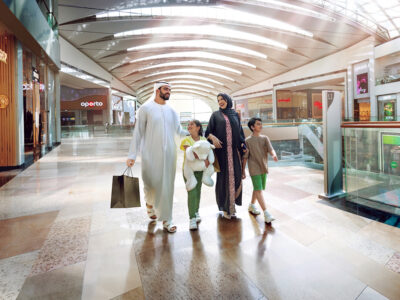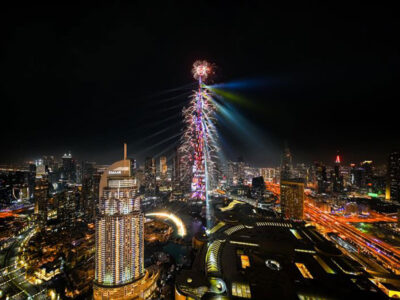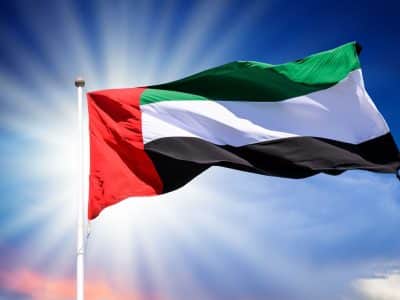When Colm McLoughlin came to the UAE some 28 years ago, the country was a very different place. The dusty roads were not lined with rows of lavish buildings that soared up into the sky.
The beachfront was not crowded with sunbathing tourists, and the airport was little more than one, small antiquated terminal. Brought over to set up Dubai Duty Free at the request of HH Sheikh Mohammed bin Rashid Al Maktoum, 40-year-old Irishman McLoughlin was one of just a handful of expats brave enough to make the move to the Gulf state at that time.
“Dubai has changed tremendously,” he says. “[When we started] the population was about 200,000 people, it’s now close to 2m. There was no stock exchange, there was no financial centre, there were about four or five hotels, and there was no Burj Al Arab, Royal Mirage, or Jumeirah Beach Hotel. The airport was one building and the Abu Dhabi road was a two lane highway. In Europe, people didn’t really know where Dubai was.”
Other expats new to the region that decade were Maurice Flanagan, Riad Kamal and Sunny Varkey. Flanagan, who came to Dubai in 1985 as the CEO of Emirates Airline, was later awarded a CBE for his services to communities in the UAE and to aviation. Palestinian Kamal moved to the region in 1974, before launching the UAE’ biggest construction firm, Arabtec. Varkey, who came to the UAE from India in 1985, created an education empire, GEMs, which very quickly made him into a millionaire.
But this was just the beginning for the UAE. Some 30 years later, these expats are among hundreds of foreign names known for their outstanding contributions to what is now the most prosperous economy in the Middle East, and one of the key emerging markets globally. Rick Pudner, CEO of Emirates NBD, Gerard Lawless, top man at the Jumeirah Group, and Deepak Khetrapal, leader of the age-old retailer Jumbo Electronics, are but a few more.
“Expats have played an essential role in the success of this country – there is no denying it,” says Abdulkhaleq Abdulla, professor of political science at the UAE University. “Without the expats and locals together, I don’t think we would ever have got to this point. Everybody appreciates it, and everybody recognises it.”
As it stands, some 80 percent of the UAE population is expatriate, with Emiratis making up just 20 percent. During the boom years, expats accounted for 90-95 percent of job-seekers, with only 5-10 percent of applications coming from UAE locals, according to property recruitment firm Macdonald and Company. Economists say the influx of foreigners was essential in light of the UAE’s ambitious growth plans but small Emirati population.
“The UAE has got a tiny population but a massive economy,” says Jim Krane, expert on Dubai, and author of City of Gold: Dubai and the Dream of Capitalism. “The employment of expats goes back more than 100 years, and is a key [reason] for the success that the country has had.”
Article continues on next page…
He adds that its decision to welcome foreigners, in a way which surrounding states did not, gave the UAE the upper hand in the race to become the Gulf region’s most advanced economy. “The UAE is different to the rest of the Gulf,” he says. “Its willingness to allow expats to work without any restrictions was a huge advantage. Other than the government, the entire private sector today is dominated by expats.”
Looking specifically at the contributions made by foreigners, one nationality certainly stands out above the rest. Indians, who account for more than half of the entire UAE population, have not only played a huge a role in constructing some of the most architecturally significant projects ever to be created, but have also been fundamental in business.
“Indians have made a very valuable contribution to industries in the UAE, not just one or two but many sectors, such as business, manufacturing, labour and construction,” says the Indian ambassador to the UAE, MK Lokesh. “India and the UAE have been very close for a long time, but the number of Indians increased after the discovery of petroleum because [the UAE] needed the manpower.”
Sparking the interests of tourists the world over, the retail sector in the emirate of Dubai has been ranked among the best in the world. Dubbed the Gulf’s shopping hub, Dubai alone is home to about 40 shopping malls, Standard Chartered estimates, having added more than one million square meters of retail space since 2006. Today, the sector accounts for around 30 percent of gross domestic product in Dubai, and analysts agree that the UAE’s expatriate community has been instrumental in its development and upkeep.
“Expats are vital to the retail sector,” says David Macadam, a retail analyst for the MENA region at Jones Lang LaSalle. “Certainly Filipinos play a huge role in the manpower element. You can see this when you look at the number of Filipinos who are shop people. Second to that would be other Arabs, and after that it would be a lot of Indian people who have brought huge brands [to the UAE].”
Among the big Indian brand names are Lulu [the Emke Group], the Apparel Group, Jashanmal and the Landmark Group, he says. Others, such as HyperPanda are also run by expats, but in this case, GCC nationals.
The CEO of Landmark Group Vipen Sethi, says his firm alone has provided 10,000 jobs in the emirates. Landmark occupies a vast amount of retail space and introduced the region to a range of international and home-grown brands. He says the hospitality of the UAE was crucial in allowing his company to expand.
“We came here in 1990 because it was a gateway to the rest of the Middle East,” he says. “The UAE has given everyone and their businesses the opportunity to grow. Expansion opportunities have been great, [in terms of] the number of malls that have come up, and the UAE has given us a fantastic platform to go into other countries.”
Going forward, both retail professionals believe that expats will continue to be crucial, and rumour has it that a new group of foreigners, namely Chinese, could be particularly valuable in the future given the growing number of Chinese tourists to the country. Dubai Duty Free, which is the biggest airport retail operation in the world, has already begun hiring Chinese counter staff.
Article continues on next page…
“We have 42 different nationalities at present, the biggest single group is Filipino,” said CEO McLoughlin. “[But] Chinese business is becoming very important, there is a lot of Chinese travelling, and Chinese purchases are increasing all the time. We will have 200 people coming from China in January, [and] we already have in excess of 100 Chinese staff.”
Perhaps more famous for their expat participation are the construction and energy sectors. According to Krane, expat involvement is far from limited to manual labour, with foreign nationals lending their technical expertise, architectural experience, advanced technologies and even interior design capabilities, to the region’s most important developments. On the construction side, he says the most iconic projects would not have been possible without expat assistance.
“The Burj Al Arab in Dubai [is an example]. Dubai didn’t have the capacity to build a building like that, the design was done in the UK, the people that built it, even the special trucks required to move the big trusses and parts around had to be brought in from South Africa,” he says.
“HH Sheikh Mohammed wanted to use that project to develop local competency in Dubai in construction. So some UAE companies were involved, but the know-how and technology and competence seeped in through those big projects.”
He adds that this is the normal development cycle for a growing economy. “It’s part of being a globalised economy, ideas and technologies are shared from all around the world. The big projects, such as the Burj Al Arab, Burj Khalifa and Jebel Ali Port, probably have components from 50-75 countries in them.”
Tourism, which accounts for 10 percent of non-oil GDP in Abu Dhabi and 3.2 percent overall, is essential as the emirate seeks to diversify its economy away from petroleum. By 2020, the UAE plans to attract a total of 15 million tourists overall.
Experts say the hospitality industry has, and will continue to be, heavily reliant on expatriate labour due to the limited demand among local nationals to enter the sector. “[Hospitality] is renowned for its long hours and, by comparison to such popular occupations as working in government or banking, it’s low pay,” says Guy Wilkinson of hotel consultancy firm, Viability. “[UAE] citizens, who enjoy a super welfare system, are thus unlikely to be in need of a job in the hotel sector.”
Chiheb Ben Mahmoud, a hotel analyst at Jones Lang LaSalle, says the need for expats has intensified over the years due to the high number of staff recruited and the inability of the industry to attract UAE nationals.
“[Tourism] is very labour intensive, especially in this part of the world. Here, hospitality is very service-oriented and the ratios of employee per room are higher than in other regions. The hospitality industry in the UAE has also not been able to provide the young Emiratis with the right career proposition to attract them in the sector. As a result, the industry is 99 percent expat-staffed and led, with a few exceptions that are more related to the personal drive of the individuals.”
Even strong UAE-based hospitality players such as Rotana and Jumeirah, are run by prominent expatriates. Lebanon’s Selim El Zyr, CEO of Rotana, has made siginificant progress in the UAE hotel sector with as many as 28 properties, whilst Ireland-born Gerard Lawless, who became head of Jumeirah in 1997, has overseen the management of the Burj Al Arab, the Madinat Jumeirah and Jumeirah Beach Hotel, as well as the firm’s expansion into Abu Dhabi.
Article continues on next page…
“The expatriate community has supported the exponential growth of the UAE hospitality industry to around 100,000 rooms at all levels of the business, both for branded and unbranded hotels,” says Alex Kyriakidis, global managing director for travel, hospitality and leisure at Deloitte. “It has benefited from the transfer of knowledge across the entire spectrum of activities that support and sustain the industry, including world leading design concepts – the Burj Al Arab being one of the most iconic hotels to this very day – through to operational excellence underpinned by global and regional hotel brands.”
He adds that in recent years, the market has seen a surge in expatriate recruitment from the wider Middle East to cater for GCC visitors, as well as an inflow of Russian expatriates to accommodate the emerging Russian market. Looking ahead, he says the market will rely more on the recruitment of Chinese nationals “for what is heralded as one of the largest feeder markets of the future – China.”
Hospitals and clinics are perhaps one of the more hidden industries when it comes to expat recruitment, but by no means does the industry benefit less from their expertise and manpower. “In the clinical sense, the majority of people who are working in healthcare in the UAE are from all around the world,” says healthcare analyst Ruch de Silva from Datamonitor. “The healthcare professionals such as nurses tend to be from the Philippines and india, and doctors fit in with the expatriate stratas of society, so they are mostly Arab expats, Western expats and expats from the Indian subcontinent.”
On the commercial side, expats have played a key role through both the influx of Indian businessmen as well as the growing number of public private partnerships. In Abu Dhabi, Western brands such as the Cleveland Clinic and International College of London are already penetrating the market.
“There is a shortage of almost every single healthcare professional in the GCC,” says BR Shetty, Indian entrepreneur and owner of Abu Dhabi-based New Medical Centre (NMC) Group. Shetty currently has eight hospitals in the UAE, with plans to build another two or three next year. He believes that expats will only become more important as the rates of diabetes, obesity and cancer rises, and that wages to this group are likely to surge along with the common practice of staff poaching as hospitals seek to retain the best talent.
Going forward, experts, economists and business people agree that the role of expatriates across all sectors will continue to be vital. A focus on Emiratisation may help boost local participation in the private sector, but in view of the ongoing economic growth targets, analysts say the reliance on foreign nationals is unlikely to dissipate.
“In the early 70s local numbers were definitely bigger than expatriates, but because…the economic strategy and outlook was so inflated and so huge, we needed more expats to come in to help with the goals,” says Professor Abdulla. “I don’t see any end to this fast growth cycle, so we’re going to see more of the same – expats will still be needed in the future.”





